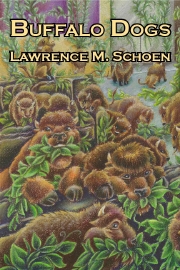Here’s the link: DaHjaj-Hol-111218
You can also subscribe via iTunes:
Advanced > Subscribe to Podcast > and enter the URL: http://bit.ly/tlh-pod
Hello, and welcome. You’re listening to DaHjaj Hol, your daily dose of Klingon language. I’m your host, Lawrence Schoen.
Today we’re going to look at third person pronouns, both the singular and plural forms. Remember that pronouns can replace other nouns, and can also be used to add emphasis to the nouns, even when a noun isn’t required because a verb prefix is already indicating person and number of the subject and object of that verb. Pronouns can also act like a form of the verb “to be” when no other verb is around.
The third person singular pronoun is ghaH. GH, A, Capital H. As the subject of a verb, ghaH means he or she, and as the object it means him or her. When standing in for a verb, it means he is or she is.
The third person plural pronoun is chaH. CH, A, Capital H. When chaH is the subject of a verb, it means they, and as the object it means them. When standing in for a verb, it translates as they are :
tlhIngan chaH
they are Klingon
ghaHvaD wa’ vatlh mIl’oD vIHoHchoH
for her I would kill one hundred sabre bears
vulqa’mo’ ghaH Qapta’ jaghwI’
because he was unconscious again, my enemy succeeded
Sooner or later you will find yourself making use of pronouns. Maybe you’ll want to add some emphasis on a subject or object, maybe you’ll want to make a simple “to be” style statement, maybe you’ll just be in the mood for some anaphoric reference. Whatever the reason, it will happen. Pronouns represent a whole new realm! qo’mey poSmoH Hol
Today’s podcast is brought to you by B.W.O.P., the Buffalito World Outreach Project, Lawrence M. Schoen’s ongoing attempt to use science fiction to reach the entire planet, and beyond. Visit bwop.info for more info, as well as to obtain a free copy of “Buffalo Dogs,” in many different languages.
Tags: Klingon

